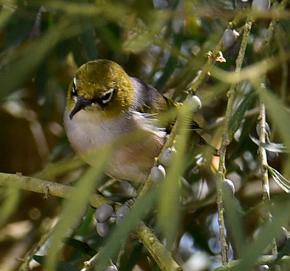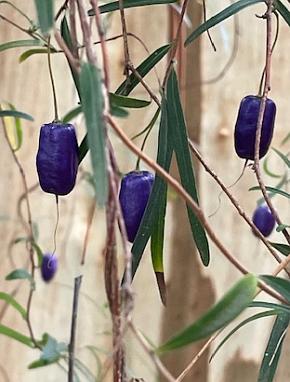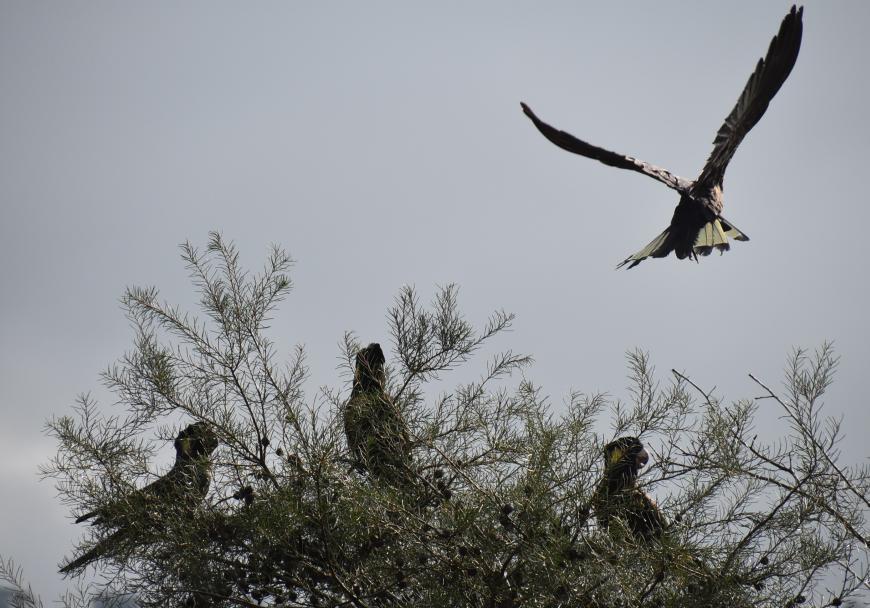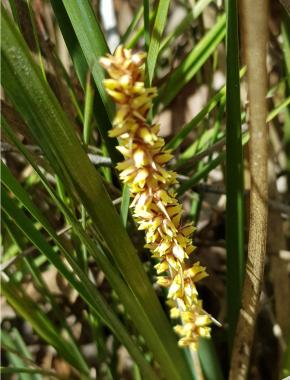Yinnar, Yinnar South Landcare Group - April 2025
By J Duncan
Bats workshop
People young and old enjoyed a twilight workshop and survey for micro-bats on February 28. We shared some pizzas and listened to a short presentation before setting out with an acoustic monitor to look for bat calls. We found that three or four species of microbats were flying around at dusk quite close to the hall in Yinnar.
One of these bats, the Little Forest Bat is said to consume more than 1,000 mosquitoes a night. What’s not to like about bats? They are truly fascinating little creatures and can catch insects with their wings or a specialised membrane on their tails. They also pollinate many plants. We were able to have a close-up look at some that had been preserved.
We also briefly discussed the macro-bats or flying foxes. We looked at the map of current bat camps and the threat posed to them by hotter temperatures. The vast distances that they can fly means that they have a critical role in regenerating native vegetation.
We are expecting results in April from the fixed bat monitors that we had in place after the workshops that will detect the bat species present with more certainty.
Birds, bats and fruit trees

We were reminded at the bats workshop to use the regulation small mesh bird nets on our fruit trees and to try and keep it as taut as possible to avoid damage to microbats.
Many people seem to have developed a dislike for some of our native birds because they see them eating the fruit from their trees. There is a lack of love from some residents. On the other hand, international visitors to Australia spent $2.6.billion on travel that involved birdwatching in the 2023-24 financial year. (https://www.abc.net.au/news/2025-02-15/tourism-industry-twitchers-birdwatching/104919868) Australia has many beautiful and unique birds that are still spectacular, interesting and valuable to the environment, however badly some people may think they behave.
What is to be done?
It has been said that the birds only want moisture from the fruit they damage. This need may be able to be met by planting something like an ornamental crab apple or a sloe plum in or near the fruit orchard.

Locally the native fruits that are no longer present in much of the landscape to provide birds with their natural food sources include:
Apple-berries: Common Apple-berry, (Billardiera mutabilis and the Purple Apple-berry (Billardiera macrantha), that grow higher up in the hills, are small climbing plants with edible berries in autumn that will scramble among other plants in the garden.
Banyalla (Pittosporum bicolour) found in the higher wet forests and shady gullies.
Muttonwood (Myrsine howittiana) a glossy-leaved small tree found in wetter forested areas. Its’ purple berries do not appear every year.
Tree Violet (Melicytus dentatus) is a very useful dark green shade and habitat plant and seems to be a favourite food of Silvereyes.
Kangaroo Apple (Solanum aviculare) is a fast growing, often short lived, native shrub that can provide valuable shade while new gardens and plants get established. It has yellow to red fruits from summer to autumn.
Humans can also eat and enjoy the berries on Prickly Currant-bush (Coprosma quadrifida). It is an erect small to medium shrub that seems to grow best under other plants.
If birds are looking for seed rather than the fruit itself, Bushy Needlewood (Hakea decurrens) and Sheoak (Allocasuarina sp.) seed pods are a favourite of Yellow-tailed Black Cockatoos and an important food for Gang Gangs.

Many of these plants can easily be incorporated into a garden or orchard. Even if they do not entirely take the pressure off the fruit trees in the fruit season, they will provide many opportunities to enjoy watching birds.

April Activitites
On Sunday April 27,we have a community workshop for gardeners with a focus on Perfecting pollinator plantings. This workshop will be about growing some of these interesting local plants in pots to increase the food and habitat for native pollinator insects in your garden. The presenter will be David Sparks who is currently Head of Horticulture at the Melbourne Polytechnic and who has previously led community workshops for our group. This workshop, like our recent Grass Identification and Bats workshops are made possible by a Victorian Landcare Grant. Adult workshop fee is $10 and bookings are on-line (only) at TryBooking and the event opened for booking on March 30 at: https://www.trybooking.com/CZETF
More about our group and events can be found on our website
https://www.landcarevic.org.au/groups/westgippsland/yinnar-south/


